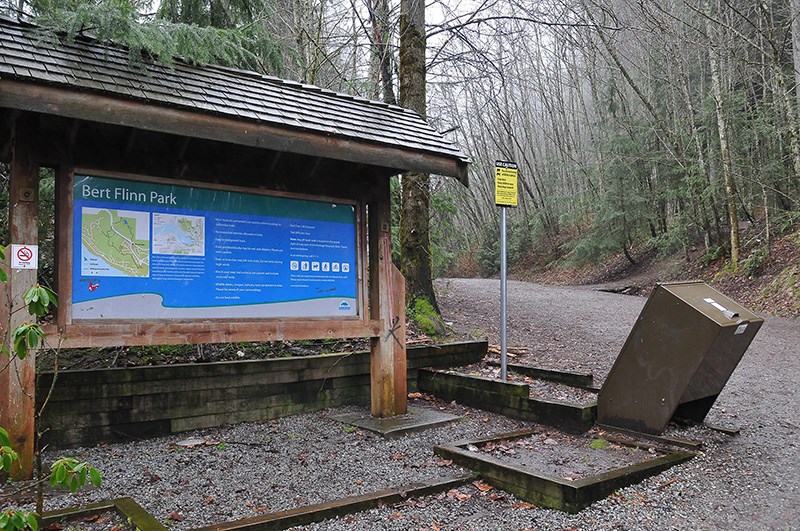The right-of-way through Bert Flinn Park will stay, for now.
At its meeting Tuesday, Port Moody council voted to defer any moves to formally remove the right-of-way through the park to accommodate a possible extension of David Avenue until council has formulated a strategic plan for the coming year. That planning session is scheduled for this weekend.
Coun. Diana Dilworth proposed the motion to defer in reaction to a staff report that removing the right-of-way from the park, as well as several other initiatives endorsed by council last November like adding more parking and building a wheelchair-accessible trail into the park, could cost as much as $318,000.
Port Moody’s engineering project manager, Chad Siemens, said fulfilling another council resolution to amend the city’s official community plan to limit density on the Ioco Lands to its current zoning would add further expense.
Dilworth questioned the urgency to remove the right-of-way, which was approved by council at a meeting Nov. 27 that she was unable to attend, as “not fiscally responsible.”
Only Mayor Rob Vagramov and Coun. Hunter Madsen opposed the deferral (councillors Meghan Lahti and Zoe Royer did not attend Tuesday’s meeting).
Madsen, who co-founded Save Bert Flinn Park, a group who's goal is to remove the right-of-way from the park, before he was elected to council in 2017, suggested several opportunities to save money, adding, “We are augmenting the park by 22 acres, so when you think about it, if you spend $80,000 or $90,000 or $100,000, it’s a small price to pay.”
In his report to council, Siemens said removing the right-of-way from the park would require a bylaw to formally close the road as well as possible amendments to the city’s OCP. A new legal survey of the park would also need to be submitted to the provincial Land Title office. That would cost about $70,000 for the survey and legal services, as well as consume about 100 hours of staff time.
If the city wants to add a further layer of protection by dedicating the former right-of-way as parkland, that process would require another $30,000 in legal assistance and public consultation, Siemens estimated, as well as up to 300 hours of staff time. Such a move would ensure the right-of-way through the park couldn’t be resurrected without a referendum vote.
Alternatively, Siemens suggested in his report the city could just allow the former right-of-way to be used as a park, without a formal dedication and no additional cost in time or staff resources.
Siemens said expanding the parking near the David Avenue entrance to the park by 10 to 12 spots would cost $160,000, and $30,000 would need to be spent to study the feasibility of constructing a wheelchair-accessible trail into the park that was requested by council.
In the report, Siemens also recommends against the city applying to TransLink to remove Ioco Road from Metro Vancouver’s major road network. But if council persists in pursuing that option, it would cost a further $50,000 and 100 hours of staff time to complete a technical study of the implications of such a move as well as options to limit further traffic increases on the route to Anmore and Belcarra along the city’s north shore.
Siemens said while removing Ioco from the region’s major road network would give the city more flexibility to reduce traffic on the thoroughfare, it would also mean Port Moody would be completely on the hook for the costs of any future maintenance or upgrades. He suggested those could be extensive.
“Ioco Road is an old road built to varying standards,” Siemens said. “Ongoing pavement maintenance, including pothole repairs and patching, is required on a regular basis.”
Last year, Port Moody received almost $1.49 million in funding from TransLink towards maintaining and upgrading the 70 km of roadway running through the city that are designated as part of the major road network, of which $247,000 went towards Ioco Road and First Avenue.
Siemens said Ioco is already in need of several outstanding projects, including almost $2 million for the rehabilitation of aging sewers and drains set for 2022, and a plan to construct cycling and pedestrian infrastructure between First Avenue and April Road that will cost about $360,000.
And even if council proceeds with its desire to request the removal of Ioco Road from the major road network, Siemens said it’s unlikely to be granted unless an alternate connection to Anmore and Belcarra is presented, raising another set of potential complications.



